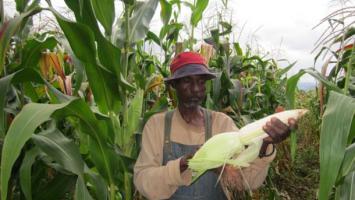The regional workshop with African Land Commissions on securing community land rights ended in Accra, Ghana, Wednesday with participants committing to advancing policy, legal and regulatory reforms in their respective countries and ensure their effective implementation in order to recognize community land rights.
Noting the diversity of their contexts, policies, legal frameworks and local communities, the Land Commissions reaffirmed their commitment to secure community lands by implementing African Union decisions relating to land governance and management.
These include the AU Declaration on Land Issues and Challenges in Africa (2009), which endorses the use of the AU Framework and Guidelines on Land Policy in Africa; the resolution of the AU Specialized Technical Committee (STC) on Agriculture, Rural Development, Water and Environment, which recommends Member States allocate at least thirty percent of land in women’s names; and the STC decision endorsing the use of the Guiding Principles on Large Scale Land Based Investments to, among other things, protect the land rights of communities.
“We agree to pursue efforts to identify, recognize, and protect the land rights of communities, including the most vulnerable groups, which are the youth, women, nomads, disabled people, and other groups with strong links to their land,” the Land Commissioners, who were meeting for the first time ever, resolved.
They reaffirmed that community-held land represented the majority of land on the continent.
Despite the overall recognition of traditional land rights by national land commissions, an imbalance persists between the land rights available to communities and those rights available to the State or private individuals who have a land title. Although the processes can be different, it is necessary to work towards equal rights, for expropriation, accessible means of obtaining credit and legally binding land certificates, the participants said in their final communique
The resolved also to encourage states to adopt an approach in favor of women, youth, and vulnerable people who make up a majority of the population on the continent, especially in establishing quotas for these groups in planning and development processes.
They also pledged to relocate land management authorities to areas that are closer to communities and to strengthen their capacity.
“At the local level, land management authorities are poorly equipped in terms of human resources and material resources. This is where it is necessary to put in place ongoing training programs that are adapted to the specific needs of the beneficiaries and to clearly define their mandate so that they are able to take into account the land rights of those most vulnerable in their work,” they noted.
All qualified administrations should also integrate ongoing trainings, with special attention paid to training local public administration agents and community institutions that manage community land.
The Land Commissions also agreed adopt and strengthen alternative methods for conflict resolution, in contexts where it is difficult for communities to access state justice systems, especially in light of the distance between the courts and rural areas, the costs of procedures, the lack of awareness about state justice systems in communities, and the number of cases before the courts that delay decisions.
“It is therefore essential to rely on methods for conflict resolution that are close by, present less of a burden for communities, are more efficient, and adapted to local customs for conflict resolution. The local institutions for conflict management should be reinforced and better supported and regulated by the state,” they said.
Zimbabwe’s Land Commission (ZLC) chairperson, Tendai Bare, speaking on behalf of the participants, appreciated the organizers for bringing the continent’s Land Commissioners together for the first time to discuss community land rights which she said were crucial to their mandates.
“We exchanged experiences and information on where we are in respect of this agenda and therefore providing us with an opportunity not to reinvent the wheel but to learn from each other on best practices,” she said, adding two field visits during the course of the workshop had been invaluable to the participants who learnt a lot from the Ghanaian experience on securing community land rights.
Participants representing land commissions and similar agencies leading land reforms from countries including Burkina Faso, Côte d’Ivoire, Ghana, Kenya, Liberia, Madagascar, Malawi, Mali, Niger, Nigeria, Tanzania, Uganda, Zambia and Zimbabwe attended the workshop that was co-organized by Rights and Resources Initiative (RRI), the African Union Land Policy Initiative (LPI), and co-hosted by Ghana’s Ministry of Lands and Natural Resources and Civic Response.

